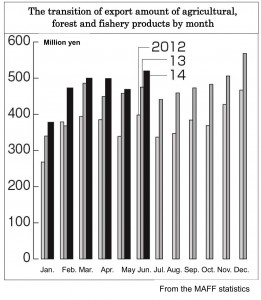 According to the statistics announced by the Ministry of Agriculture, Forestry and Fisheries (MAFF), the export of agricultural, forest and fishery products and food in the first half-year (from January to June) of 2014 amounted to JPY 284 billion, which increased by 10 percent compared to the record-high trade value of the last year’s same period. The growth of beef and rice trade was significant. The Japanese government has set a goal to increase the trade amount to JPY 1 trillion by 2020. The MAFF plans to continue efforts toward creating preferable environments by asking other countries to ease trade controls.
According to the statistics announced by the Ministry of Agriculture, Forestry and Fisheries (MAFF), the export of agricultural, forest and fishery products and food in the first half-year (from January to June) of 2014 amounted to JPY 284 billion, which increased by 10 percent compared to the record-high trade value of the last year’s same period. The growth of beef and rice trade was significant. The Japanese government has set a goal to increase the trade amount to JPY 1 trillion by 2020. The MAFF plans to continue efforts toward creating preferable environments by asking other countries to ease trade controls.
The last year’s trade amount reached a record high of JPY 550.5 billion with the help of reasonable prices by a weak yen and the Japanese food boom. However, there is still much more to reach the target amount of JPY 1 trillion by 2020. To steadily approach the goal, it is important to increase the trade amount and set the growth in place while Japan can benefit from a weak yen.
When looking at the trade amount by item, rice (excluding rice for aid) is JPY 0.6 billion, which increased by 42 percent compared to that of last year; sake (refined) is JPY 5.5 billion, increased by 9 percent. The trade of rice and its processed products grew significantly. As for those with large growth rate, the export amount of beef is JPY 3.5 billion, increased by 27 percent compared to that of last year; milk powder, JPY 1.2 billion, increased by 70 percent. As for the trade by country, that of the United Arab Emirates largely increased. However, these growth rates are easily influenced by sporadic actions like an export contract by a certain company because the export amount itself is still small.
For expansion of export, the MAFF is making an effort to create preferable environments by easing trade controls of each country. The MAFF is asking for relaxation of regulations to those countries that restrict imports from Japanese agricultural, forest and fishery products and food due to the nuclear meltdown in Tokyo Electric Power Co.’s Fukushima No. 1 power plant. Most recently, the European Union (EU) has narrowed the range of prefectures and products that need inspection certificates. As the largest export partner Hong Kong now partly suspends import from 5 prefectures including Fukushima, the Minister of MAFF Yoshimasa Hayashi will also ask for loosening of trade controls at the meeting with the Hong Kong’s Cabinet members on August 13.
Moreover, discussion on quarantine inspections of beef is continued among the governments, and the export ban was removed this year in New Zealand, Mexico, Vietnam and Philippines. The MAFF says we need to look over the effects of these efforts in the long term as they are not directly reflected to the export performance.
The MAFF set up in June an executive committee of export strategy that can be a control tower for export expansion. The committee asked for opinions of the people concerned in each area in July and August, and the opinions will be reflected to the future policy for export expansion.
(Aug. 13, 2014)

